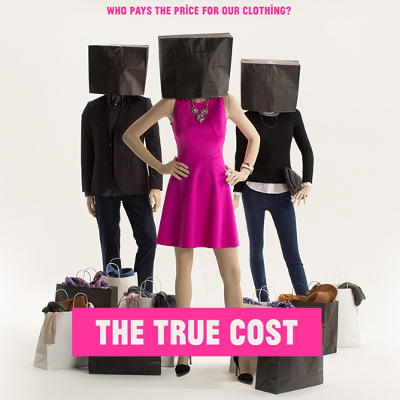We are very fortunate, but one pitfall of the modern world is the pressure to have more, look better, and buy more. I happened upon the documentary The True Cost and it changed the way I look at those pressures, specifically when it comes to my clothes.
Someone is Paying for Our Bargains
Our cute, cheap fashions are damaging the world. It is easy to lose our connection to the earth and the impact overseas factories have on it and to the people who make our clothes thousands of miles away. Here are the facts:
- The price of clothing has been decreasing for decades, but the human and environmental costs have increased dramatically.
- 80 billion pieces of clothing are purchased worldwide each year; 400% more than a decade ago.
- 97% of the items we wear are made overseas.
- There are ~40 million garment workers (85% of them are women) working in 250,000 factories
- These garment workers don’t share the same rights we do. They work long hours, in horrible conditions, for very little pay.
- Three of four of the worst garment factory disasters in history happened in 2012 and 2013, killing thousands of people, and little has changed to prevent that happening again.
- We consistently see the exploitation of cheap labor and the violation of workers’, women’s, and human rights in developing countries.
- Industry giants (our favorite brands) claim negligence because they don’t technically “own” their factories and thus don’t have to take responsibility.
The takeaway: there are people and consequences behind the clothes we wear.
What You Can Do About It
It can be upsetting to think of the impact your closet has had on the environment and women around the word, but being part of the change isn’t hard. Here are 7 steps you can take to make a difference:
- Obey the 30 Rule – Before you buy an item, ask yourself if you’ll wear it 30 times. If not, skip it.
- Stop Buying So Much – How often do you really need new clothes? Spread out your normal purchase cycle.
- Make Your $$ Count – Spend your money on producer-centric brands with fair-trade standards. Find a starter list here.
- Protect the Environment – Fashion is the world’s second most polluting industry after oil, largely due to synthetic dyes – check your labels.
- Reduce, reuse, recycle – instead of trashing yesterday’s clothes, donate, sell, or repurpose them.
- Ask questions – Who made my clothes? Google the company and their practices. Be a conscious consumer.
- Buy clothes made in the U.S.A – Business is more closely regulated and workers have rights.
Learn more here and watch The True Cost on Netflix.
How do you buy better?
Leave a comment below with ideas on where to ethically shop or how you minimize your footprint.


Love your blogs they are fun and thought provoking. Thank you for this one especially, an important reminder about how vast our carbon footprint really can be. I drive a hybrid, buy local organic food but have been guilty more than once of buying clothes that are great "deals". I love the 30 rule and will try it starting today.
@Kathleen – thank you for the kind words! And great job on all your steps to have a smaller footprint. I believe every effort makes a difference.
I love the 30 Rule too! It changes your whole perspective on clothes.